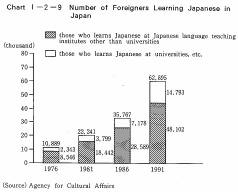| Home > Policy > White Paper, Notice, Announcement > White Paper > JAPANESE GOVERNMENT POLICIES IN EDUCATION, SCIENCE AND CULTURE 1993 > CHAPTER 2 �6 1 | ||
Along with Japan's recent increased importance in the international community and the trend towards a greater amount of international exchange, the number of foreigners learning the Japanese language as a foreign language or the second language has been increasing, especially those learning in countries outside of Japan has been increasing as well. The number of foreigners learning Japanese at Japanese language teaching institutions in various countries was estimated at 980,COO in 1990, an increase of 2.5 times over the figure for the previous decade. Including those who learn by means of television and radio, the number of foreigners learning Japanese is estimated to be two to three million.
Within Japan, because of progress made by such programs as the "Plan for 100.000 Foreign Students by the Year 2000", the number of foreigners desiring to learn the Japanese language is increasing rapidly. The number of foreigners learning Japanese in Japan was about 63,000 as of November1991, a threefold increase over the figure for the previous decade (Chart I-2 - 9).

Foreigners' motives for learning Japanese are becoming more diverse in nature. Its reasons are no longer limited to preparation for study at Japanese institutions of higher education or the study of Japanese literature, art, performing arts and the like, but now include such reasons as preparation for joint study within Japan in the fields of science and technology, preparation for participation in business or study of technological skills in Japan or preparation for employment in Japanese business firms. There are also refugees who are learning Japanese to settle down in Japan, children of foreigners and South Americans of Japanese descent who are learning Japanese out of necessity to adjust to life in Japanese society and to Japanese school education.
This situation may be indicative of a process in which the Japanese language is becoming an international language, no longer a language of the Japanese people alone. When compared to the field of national language education for Japanese, however, Japanese language education for foreigners entails many problems that need special consideration.
To learn a language is to deepen one's interest in the country in which that language is spoken and in its culture, and eventually to deepen mutual friendship between the people themselves. It is therefore necessary now more than ever to enhance Japanese language education to meet the needs of the increasing number of foreigners who are learning Japanese both within Japan and abroad, and to effectively deal with their various motives for learning.
The Ministry of Education, Science and Culture, the Agency for Cultural Affairs and other related institutions are carrying out the following policies with regard to Japanese language education.
| Back to Top | MEXT HOME |